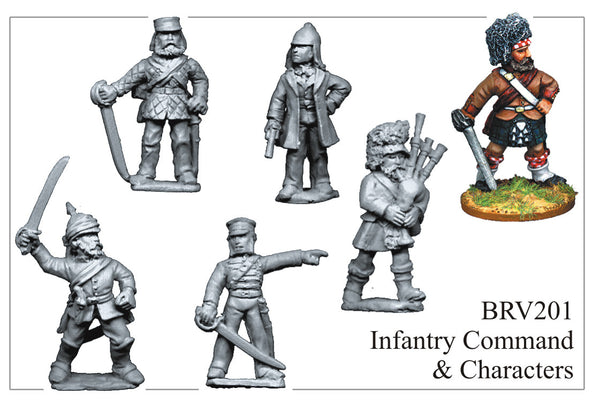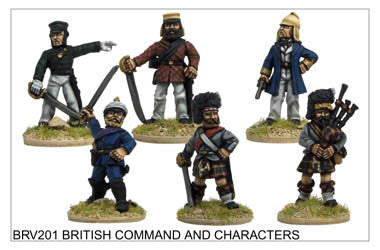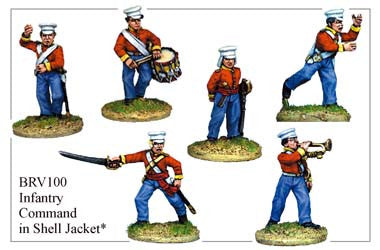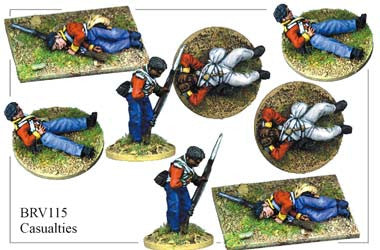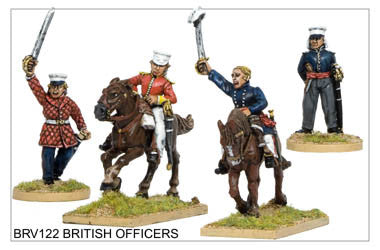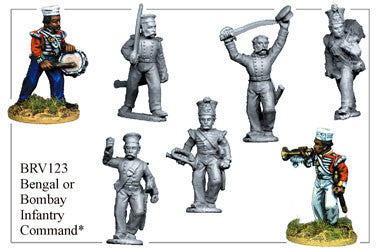BRV201 British Command and Characters
Figure in top left of painted image is a Gurkha Officer, top right is a Naval Officer.
British Infantry in the Indian Mutiny
The British Army were caught unawares by the speed of the Mutiny. Many units were diverted from other parts of the Empire or raised on a rather ad hoc basis. This meant that a wide variety of uniforms was used. Some regiments had the home service kit of red jacket and blue trousers.
Others such as those that had been en route to China were issued with ship’s smocks. Units already in India often hastily dyed khaki their white hot weather kit. As this was done locally on a regimental basis there was a wide variety of shades. All kinds of dye-stuffs were used from mud to tea . One unit at least even mixed red and black inks together.
EXAMPLES OF SOME UNIFORM TYPES
- 52nd Regt. (Light Inf.) (Oxfordshire). All khaki. Flannel shirts worn outside linen trousers. Some wrapped muslin around the spine as protection against the sun. Pugris were frequently wrapped around Kilmarnock caps, or else covers and neck curtains were used.
- 34th Regt. of Foot (Cumberland). Red tunics, faced yellow. White trousers. White covered shakos .
- 42nd Regt. of Foot (Royal Highland). Supposedly highland bonnet with sunshade or glengarry, but reports suggest many retained old Kilmarnock caps. Tunics white initially, later khaki, with red facings.
NAVAL BRIGADE
Headgear sennet straw hats, sometimes with neckcloth, also peaked forage caps and sun helmets with covers and curtains for officers. Sailors short blue jackets, white trousers. Jean collars, blue with 3 white stripes. Officers blue frock coat, gilt buttons and lace. White trousers. CMB054.
HON. EAST INDIA COMPANY REGTS.
- 1st Madras (European) Regt. (Fusiliers). Nicknamed “Neill’s Bluecaps” after the forage caps that were worn, both with and without peak. The covers also went over any peak. White or khaki tunics.
- 3rd Bombay (European) Regt. Models as for 1st Madras.
- In May 1858 described as wearing stone coloured uniforms. Forage caps and pugri. Pugris for any of the units need not be totally uniform as men often used whatever material was to hand.
- 4th Sikh Infantry (Punjab Irregular Forces). All khaki tunic and trousers, grey/ khaki turban. Brown or less frequently black pouch and belt. Black bayonet frog and rifle straps. The Regt. of Feozepore was dressed in similar fashion except turbans were red.
- 1st Belooch Battalion, Bombay Native Inf. Dark green turbans and jackets, red trousers, black equipment.
GURKHAS
- Sirmoor Battalion. Officers dark green forage caps or white cover and curtain. Dark green shell jacket, white trousers, sometimes gloves. Pouch belt & sword belt black, fittings silver. Riflemen all dark green, with black woollen edges to shoulder wings and edges of shoulder straps. Black chevronsfor NCO. Black leather equipment with brass fittings.
- 7th (Kumaon Battalion). Models as above. Adopted khaki rather than rifle green.
Guides & Dograhs
British officers. A combined infantry & cavalry unit. Infantry khaki turbans, tunic (with red facings) and trousers.
Cavalry khaki or blue turbans, otherwise as infantry. Long black boots.


